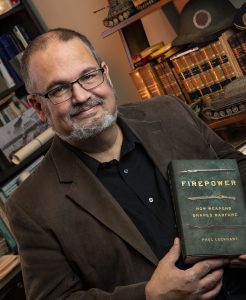Paul Lockhart, Ph.D., professor of history, and Peggy Kelly, academic director of developmental mathematics, have been appointed Faculty Fellows at Wright State University’s Center for Faculty Excellence.
Both Lockhart and Kelly will serve two-year terms at the center, formerly the Center for Teaching and Learning. Lockhart is Faculty Fellow for Scholarship. Kelly will be Faculty Fellow for Pedagogy.
The Center for Faculty Excellence provides resources and programs that enable faculty to develop and implement innovative teaching and learning strategies, sustainable research and scholarship plans, and effective leadership and service profiles.
The Center for Faculty Excellence is committed to providing resources and programs to support faculty across the three broad areas of faculty work, enabling faculty to develop and implement innovative teaching and learning strategies across the modalities; sustainable research and scholarship plans; and effective leadership and service profiles.

Peggy Kelly, academic director of developmental mathematics, is the Faculty Fellow for Pedagogy in the Center for Faculty Excellence.
Carol Loranger, Ph.D., interim vice provost for faculty affairs, said she is thrilled that Kelly and Lockhart have agreed to be the inaugural Fellows of the newly branded center.
“Ms. Kelly has already been instrumental in the development of our forthcoming call for proposals for Teaching Enhancement Grants,” said Loranger. “As Faculty Fellow for Pedagogy, she brings with her a successful track record of working with faculty colleagues to enhance teaching for student success.”
Kelly has been a teacher her entire professional career and earned both her bachelor’s degree and master’s degree from Wright State.
A senior lecturer, she teaches gateway mathematics courses and helped to create and conduct the Developmental Mathematics program in the College of Science and Mathematics.
Loranger said Lockhart is both a world-renowned scholar in his fields and a popularly successful public intellectual.
“More importantly for the purposes of his role as a Faculty Fellow for Research, he is open-minded and curious, with a capacity to bring people together into exciting collaborations and to bring out the best in colleagues in diverse disciplines,” Loranger said.

Paul Lockhart, professor of history, is the Faculty Fellow for Scholarship at the Center for Faculty Excellence.
Lockhart said one of his goals is to help mentor faculty engaged in serious scholarship and help them find the resources they need.
“Mid-career faculty are often those who are most in need of support, and I think Wright State can do more to provide motivation and support to help faculty — hard-pressed by service obligations and teaching — to keep their research agendas active,” he said.
Another goal, he said, is to promote the school’s research activities both on campus and in the outside community.
“It’s easy to lose sight of the fact that Wright State has top-notch, world-class scholars, researchers and scientists in virtually all of the fields that the faculty represents,” he said. “Putting a more public-facing spotlight on our research activities is utterly vital to our prosperity as an institution.”
Lockhart received his Ph.D. in European history and master’s degree in history from Purdue University and his bachelor’s degree in history from SUNY Potsdam.
He was the Brage Golding Distinguished Professor of Research at Wright State for 2014–18, in recognition of his distinguished scholarship in American military history and early modern Scandinavian history. He is the founder and director of the graduate and undergraduate programs in the history of war and society.
Lockhart received the 2020 Distinguished Historian Award from the Ohio Academy of History and in 2021 was elected to The Royal Society for Danish History for making significant contributions to Denmark’s history.
He is the author of seven books including “Denmark in the Thirty Years’ War, 1618-1648: King Christian IV and the Decline of the Oldenburg State,” “The Drillmaster of Valley Forge: The Baron de Steuben and the Making of the American Army,” “The Whites of Their Eyes: Bunker Hill, the First American Army and the Emergence of George Washington” and most recently “Firepower: Weapons Technology and the Art of War, 1400-1945.”

 Difficult conversations
Difficult conversations  Celebrated Wright State alum serving his community as surgeon
Celebrated Wright State alum serving his community as surgeon  Wright State University Foundation awards Students First Fund grants
Wright State University Foundation awards Students First Fund grants  Cosmic collection
Cosmic collection  Wright State revives student-faculty collaborative writing journal
Wright State revives student-faculty collaborative writing journal 